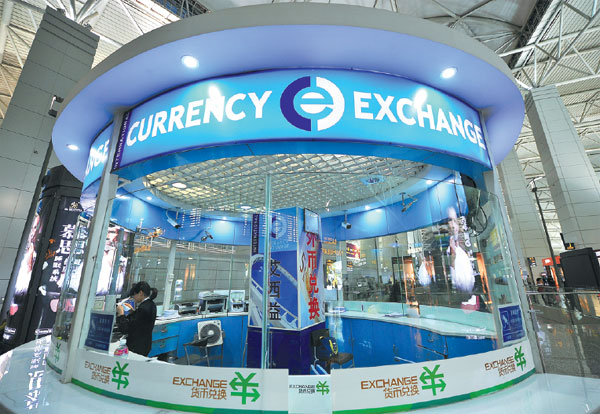PBOC boss sheds light on yuan exchange rate
|
A currency exchange counter at Guangzhou Baiyun International Airport. Provided to China Daily |
Zhou says central bank policies will gradually make way for market forces
Zhou Xiaochuan, head of the People's Bank of China, shed new light on the central bank's policies on interest rate liberalization and the yuan's exchange rate in the latest Bo'ao Forum for Asia.
On Friday, Zhou pledged the PBOC will gradually exit from its present regular interference with the exchange rates to make way for market forces to determine the yuan's price.
The change is another reform that will see two-way fluctuations in the currency's exchange rate, although they will not necessarily reflect the central bank's monetary policy.
Cross-border use of the yuan has moved forward rapidly since the financial crisis of 2008, when preparations for the development were minimal, the senior central bank official said.
Zhou promised that further steps will be taken toward the marketization of the yuan exchange rate after the PBOC widened in March its daily fluctuation against the US dollar from 1 to 2 percent.
The pledge was made shortly after a recent depreciation of the yuan against the US dollar was seen as a threat. The United States warned Beijing on Monday that the depreciation would cause "serious concerns" if it signaled a policy shift away from having a market-determined exchange rate, Reuters reported on April 7.
The yuan's exchange mechanism has evolved consistently with China's reform and will allow the market to play an even bigger role in the future, Zhou said.
On Thursday, the central bank governor said China will quicken the process of yuan interest rate liberalization and expand the band of fluctuation for the interest rate on renminbi deposits, giving greater power for financial service institutions to set their own prices for holding the currency.
Zhou said China will also quicken the yuan's convertibility on the capital account to facilitate the business of private investors and capital market transactions. The statement was made after the announcement that, after six months of preparation, investors in the Shanghai and Hong Kong stock exchanges will enjoy access to each others' markets.
In another development, Yi Gang, deputy head of the PBOC, said on Thursday on a panel hosted by the Johns Hopkins school of advanced international studies that the recent depreciation of the yuan was normal and China remains on track to let markets play a more significant role in determining its value.
"If you look at the volatility of all currencies, probably the yuan's is among the lowest," Yi said, commenting on its movements in February and March.
"The depreciation is only something like two percent. Any currency you look at, for example with the yen or the euro, that kind of movement is perfectly normal," he said.
Yi promised the future direction is one of China liberalizing exchange rates. "My forecast is that the yuan will more or less see flexibility increase and it will move both ways, unlike before when it was all one way," said Yi.
Some analysts say the recent PBOC moves regarding the yuan do not suggest a fundamental shift of policy toward a weakening of the currency.
The currency's annual appreciation pace reached as high as 4.4 percent in the fourth quarter of 2013, compared with a quarterly average of 2.1 percent over the past two years. Some say it is too fast a pace for exporters and manufacturers to accommodate.
"Two-way volatility is consistent with the PBOC's medium-term objective to increase the flexibility of the yuan exchange rate and move the currency toward convertibility," said DBS Bank Economist Nathan Chow.

























